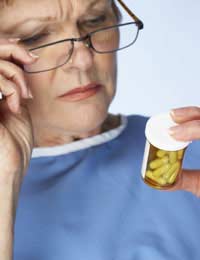Fatty Food and Drugs

Taking drugs isn’t as simple as just swallowing them with a glass of water – the food we eat before we take the drug changes how a drug is absorbed. Having a high-fat meal before taking a drug can reduce or increase the effect that a drug has, potentially making it less or more effective, or increasing its side effects.
Drugs in the Stomach
Fatty food slows the speed that the contents of the stomach move into the small intestine, the next part of the gut, so drugs taken with fatty food will stay in the stomach longer than drugs taken with non-fatty food.As drugs are mostly absorbed in the small intestine, if the stomach empties more slowly, the drugs will be absorbed more slowly. Some drugs, such as painkillers, sedatives (drugs to calm people down) and hypnotics (drugs to help sleep) need to be absorbed quickly to work, so these may not work as well if taken with fatty food.
The stomach is very acid, and breaks some drugs down. The longer these drugs stay in the stomach, the more of the drug will be destroyed, so leaving less of the drug to have an effect on the body. Examples of this include some antibiotics such as azithromycin, ampicillin, erythromycin and phenoxymethylpenicillin, and isoniazid (used in tuberculosis).
Some drugs do not normally dissolve very easily, but stomach acid may make them more soluble, and so more easily absorbed. Some drugs need the acid conditions in the stomach to change them from an inactive form to an active form.
In these cases, if the drugs stay in the stomach for longer, more drug could be dissolved or changed and absorbed, so possibly increasing side effects, or requiring a lowering of the dose. Examples of this include amprenavir (used in HIV infection) and itraconazole and ketoconazole (used in fungal infections).
Fat-soluble Drugs
Some drugs dissolve in the fat in food and this improves their absorption, which could potentially lead to side effects. Examples of this include griseofulvin (an antifungal).Some drugs come in extended-release formulations, which means they don’t need to be taken as often. Taking these with high fat food can result in ‘dose dumping’, when all the drug is delivered at once. This could cause side effects, and means that the drug won't be effective for as long.
Side Effects
Some drugs, such as orlistat, are designed to block the absorption of fat to help in the treatment of obesity. Taking these and still eating a high fat diet can result in unpleasant side effects, including fatty or oily stools and incontinence.What to Do?
When taking drugs, check whether they should be taken before or after food. If they need to be taken after a meal, avoid high-fat food (unless specifically instructed to take the drug with fatty food), because this can affect the absorption of the drug, making it more effective (and potentially making side effects worse), or making it work less well. If in doubt, speak to a doctor or pharmacist.- High Protein Diets and Drugs
- High Fibre Diets and Drugs
- Timing of Drugs - Before or After Food
- Vitamin Interactions With Drugs
- Why Do Food and Drugs Interact?
- Will My Doctor Inform Me About My Diet and Medication?
- Is it Important to Know How Medicines React With Food?
- How Do I Find Out if Foods React With Drugs?
- Can Food and Drug Interactions Be Fatal?
- What Are Drug and Food Interactions?

Re: Which Drugs or Foods React With Enoxaparin?
I am presently treating a DVT with clexane. I have also read so many articles which state that ginger has blood…
Re: Which Drugs or Foods React With Aspirin?
I had breast cancer 18 months ago. I had a mastectomy and have had chemo and radiotherapy Medication I am…
Re: Which Drugs or Foods React With Agrylin?
I am considering Agrylin because I have been onHydroxyurea for 8 Years. I have had 26 surgeries for skin cancer…
Re: Fatty Food and Drugs
Advocate for fatty meal intake prior to administration of lipophobic drugs when a delayed onset of action of drug is desired
Re: Fatty Food and Drugs
Advocate for fatty meal intake prior to administration of lipophilic drugs when a delayed onset of drug action is desired. I humbly need help
Re: Which Drugs or Food Interact With HRT?
I’m currently on Prempro and it seems to have started to not work as greatly as it had. Rather than up my dosage…
Re: Which Drugs or Foods React With Inhibitors?
@Jojo - it sounds like a case of keeping to what has been tried and tested! Hope you're now back to normal.
Re: Which Drugs or Foods React With Inhibitors?
I have been on Nardil for many years, and have had one or two incidents in the past, headaches…
Re: Which Drugs or Food Interact With HRT?
I am on hrt patches can I take fo ti which is a Chinese supplement along with them
Re: Which Drugs or Foods React With Warfarin?
Papa - Your Question:I take 6mg warfrain daily after having pulmonary embolism covering both lungs.Can I take an…